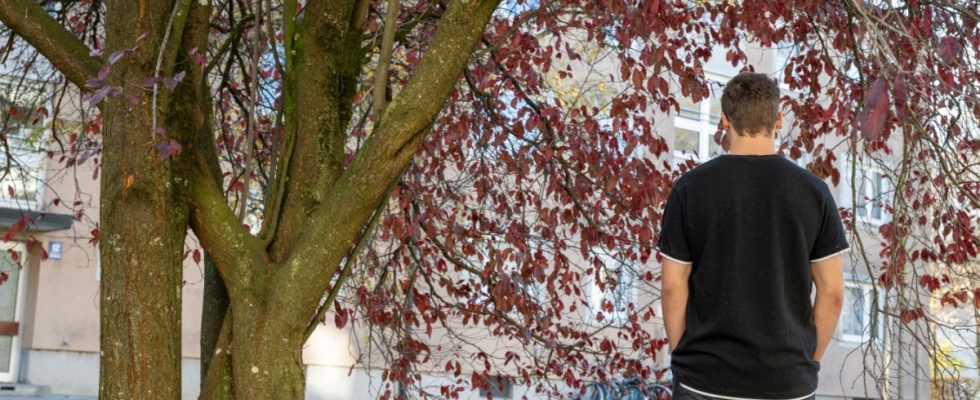From children’s home to children’s home, to a residential group and finally to the psychiatric hospital. Before Deniz N. (Name changed by the editors), 16, was allowed to go home again, he went through a few stops. When he talks about it today, he remains composed and speaks almost emotionlessly. In a room at Diakonie Hasenbergl, he sits calmly next to a supervisor who accompanies the conversation.
Deniz has short brown hair, wears gray jeans, a white shirt and dark glasses and looks like an average teenager. But what immediately stands out is his language. Deniz speaks very carefully and confidently and hardly uses colloquial language. His calm and relaxed manner makes the contrast all the more clear when he talks about himself and his past. “I was also very aggressive. I don’t break things, but I actually hit. That’s a big problem, hitting,” says Deniz. No emotion can be seen in his facial expressions. He continues: “I’m glad that I’ve gotten over that to some extent. So I rarely strike anymore. Or what does rarely mean, hardly at all.” He is aware that this behavior would be a major problem for his future and has also caused problems in the past.
Deniz’s past is characterized by insecurity, change and poverty. At the age of eight he was sent to a children’s home because his father was violent. After that, he had little contact with his mother and six siblings. “It was actually very bad, also because I knew that my little brother was in the same house and that I could actually visit him every day. But I wasn’t allowed because otherwise I would have gotten in trouble. And that of course made me very sad made,” says Deniz.
One of his brothers was initially placed in the same children’s home, while all other siblings were distributed throughout Germany. Although they all live in the same household with his mother again today, the relationship between them is rather cool. “In hindsight, of course, it really annoys me. Because I could get along better with my siblings than I do now,” says Deniz. Nevertheless, he enjoys being home again.
Through his older brother, Deniz became aware of Diakonie Hasenbergl’s sports offerings. He has been playing on the soccer team for a little over a year, is part of the climbing group and was even able to upgrade his own PC for another Diakonie project. “This is perhaps also a clear example of trying to make the best of it with few resources,” says Alexander Kralj, head of the sports groups. The idea of upgrading old equipment together came to him and Deniz while they were traveling with the climbing group. Because the PCs are simply missing and you also need them for school, among other things.
Sports activities such as climbing are expensive. Diakonie Hasenbergl finances these offers and projects through donations, among other things, and can thus give young people opportunities that they would otherwise not be able to afford.
Making the most of your life – that also applies to Deniz. With the help of his carer, he started a voluntary social year at the daycare in December. “Well, I can actually imagine working in a home or as an educator. Because I just like working with people and I could pass it on and maybe even do something better,” says Deniz. In his future he definitely wants to do something that he enjoys. Money doesn’t play a big role.
When Deniz thinks about money, it’s because he wants a different childhood for his siblings than his. Back then it was completely normal to repair shoes with hot glue or wear clothes with holes. “It’s very important to me that my younger siblings have a more pleasant childhood and also grow up with a little more money where they can go out and buy themselves an ice cream,” says Deniz. That’s why he wants to support his family as soon as he earns money. The family currently lives on the income of his single mother, who runs a fitness studio. Although money is often tight at the end of the month, Deniz is noticeably proud of her. “She used to be a cleaner at the gym in Milbertshofen, and from there she rose to the position of boss,” he said.
Due to the many stays in the homes, the great distance from his mother and his father’s abusive behavior, closeness is something that is difficult for Deniz. “I would be happy if I had that. But I don’t. But I mean, the relationship with my mother is actually great. We get along well,” says Deniz.
It seems as if the young person has completely understood and accepted his situation. Ultimately, he is sometimes glad that he has learned humility. “A friend of mine goes to the village shop every morning and buys a roll, every day. It’s completely normal for him. He needs it, he says, I would say these are all needs that can be fulfilled.” says Deniz.
Here’s how you can donate
Advent calendar for good works from the Süddeutsche Zeitung eV
Stadtsparkasse Munich
IBAN: DE86 7015 0000 0000 6007 00
BIC: SSKMDEMMXXX
www.sz-adventskalender.de, www.facebook.com/szadventskalender

